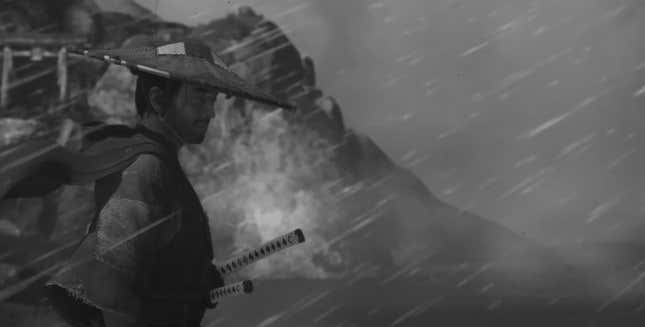
Ghost of Tsushima’s Kurosawa Mode is a black and white cinema-style filter that pays homage to the filmmaker Akira Kurosawa. While it might seem like a surface-level nod to the Kurosawa films that inspired the game, the game reflects the famed filmmaker’s sensibility in more than just visual cues.
Note: This article contains spoilers.

Traditionally, as Japanese film scholar Donald Richie pointed out, Japanese movies have been divided into two categories: jidai-geki, or “period pieces,” and gendai-mono, or “modern-day movies.” Kurosawa made excellent entries in both, but Ghost of Tsushima is clearly inspired by jidai-geki.
“I have long thought that the Japanese jidai (period) picture is very often historically uninformed,” Kurosawa told Donald Richie in an interview in a 1964 Sight & Sound interview. While Ghost of Tsushima gets things wrong about Japanese history (as Kotaku previously pointed out), it does right about the spirit of Akira Kurosawa. For a game with a specific mode named after the director, this is important.
In Ghost of Tsushima, you are Jin, a samurai who goes rogue to save his island by turning into a stealth “ghost” assassin. A central concept of the game is that a samurai must cast aside his codified behavior, so instead of bravely charging at enemies, you can sneak around in the shadows to stab enemies in the neck, shoot them with poison darts, and blow things up. It’s not honorable by the game’s accounting, but it works and, as a player, it’s fun. The game doesn’t glorify the samurai so much as show their method of fighting to be highly ineffectual and costly. This is why an army of them was slaughtered on the beach and why Jin is able to defeat countless enemies by casting aside their methods.
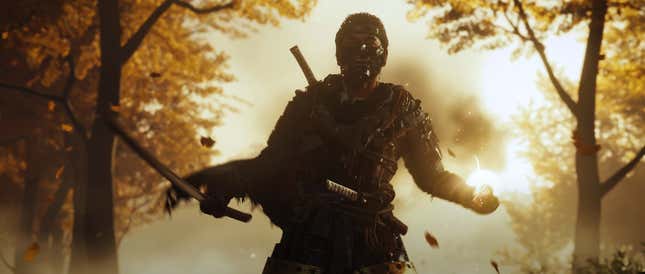
Much of the game is spent grabbing supplies out of enemy camps and regular people’s houses. For Jin, there is no distinction. He’ll take whatever he can to get a sweet new bow.
Ghost of Tsushima, however, does not force players to take this rogue ninja-esque route. You can play it as a samurai, decked out in full armor, challenging anyone and everyone to a duel. It does, however, incentivize playing as the ghost, allowing players to take less damage and get out of situations unscathed. It’s your call.
This importance on self was key to Kurosawa, whose movies examine themes like the individual within a group, and the triumph of the self. Kurosawa strongly believed in the individual’s right to determine the best course of action. He didn’t only believe this was necessary for characters in his movies, but for Japan as a country. This was his reaction to the dangerous groupthink that permeated during World War II.
“I believed at that time [after World War II] that for Japan to recover it was necessary to place a high value on the self,” Kurosawa said. “I still believe this.” While subtle, this is a political philosophy. He believed in the individual.
In the years following the war, Japan got a new constitution and became a democratic nation. The emphasis on the individual resonated with the filmmaker. “I felt that without the establishment of the self as a positive value there could be no freedom and no democracy,” said Kurosawa.
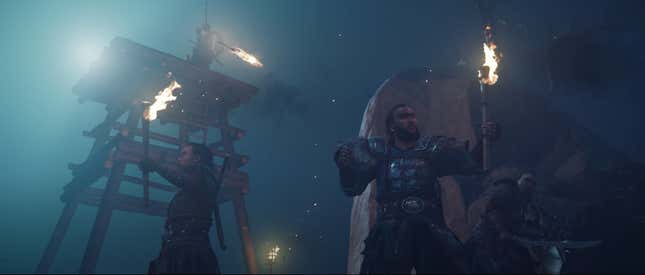
Ghost of Tsushima is a game in which it is up to you, the individual, to turn the tide. You need to convince others to join your cause when you’re not traveling through the countryside, picking off enemies, finding flowers, and following foxes. It is up to Jin and his cohorts to take down the Mongol forces. Their tactics, which cast aside the samurai ideals, will win out. This self-determinism is seen throughout Kurosawa’s filmography. According to Dennis Lim of the Los Angeles Times, “The constant in his films was the principle of heroism, not as a vaporous ideal but a way of life, an awareness of individual agency and personal responsibility in a world that does not always reward or even allow heroic behavior.”
Similarly, at the end of Ghost of Tsushima, Jin is blamed for going off on his own and deciding to use unsavory methods to defeat the Mongolian forces. His lethal effectivity does not matter; what does is that he has left the group. As noted in the 1991 book The Warrior’s Camera: The Cinema of Akira Kurosawa, the concept of kokutai, which can be translated as “national identity, essence and character” or “body politic,” was formulated in a way during World War II that blamed Western consumerism for undermining innate Japanese qualities. Not only were arguments made against the West, but also Western ideas of individualism, with societal problems blamed on people for their inability to be part of a group.
Kurosawa was born in 1910 at the close of the Meiji era (1868-1912), a period in which Japan opened up to the Western world like never before. Young Kurosawa was delighted to find samurai in his family tree, but he was also a product of his time, later recalling, “In the Edo period Japan was a very closed society. Then in the Meiji era everything came rushing in from abroad at an incredible rate. We all tried to absorb this as quickly as possible—western literature, painting, music, art. So it’s all part of my make-up and comes to the surface very naturally.” Like his peers, Kurosawa grew up reading Shakespeare, Balzac, and Dostoevsky. He soaked up the cowboy yarns of Hollywood filmmaker John Ford, one of his biggest influences, as well as those of Howard Hawks.
When Kurosawa first made an international splash on the film festival circuit, foreign film critics were expecting him to draw on influences from traditional Japanese art. But Kurosawa liked Hollywood westerns and American crime novels. He considered himself a citizen of the world, as comfortable abroad as at home. He also felt that his films could be understood by people anywhere. “I make my films from the viewpoint of an individual who happens to live in Japan. But I don’t believe that society is structured all that differently from country to country. So what I see from my experiences in Japan should be understandable to people of other countries. On top of that, the film medium is truly international,” reads The Warrior’s Cinema.
Today, more than ever, video games are the world’s truly international visual medium. Developers all over the world make critically and culturally relevant games as well as commercially successful games in a way that international film and TV often do not. This global nature of video games has made possible, for example, Osaka-based Capcom to explore rural Americana in Resident Evil or Washington’s Sucker Punch Productions to delve into 13th century Japan.
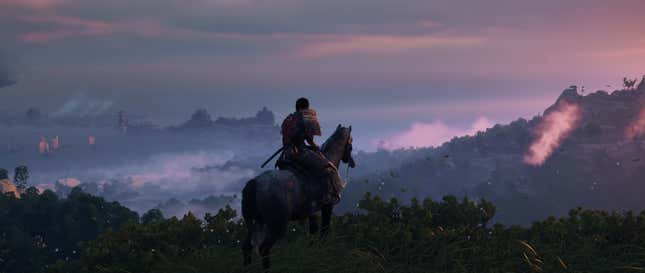
In the years following World War II, individualism was no longer a dirty word in Japan. This is perhaps why the idea of self and the individual are such powerful themes for Kurosawa, who grew up influenced by individualistic thinking, saw it vanish during the war, then be valued once again in the years that followed. Individualism and self can seen time and again in Kurosawa’s films and is central to Ghost of Tsushima. For instance, Jin makes decisions that are antithetical to the class in which he exists, which puts him at odds with other members of that class. This is also seen in Kurosawa’s work, as Stephen Prince in The Warrior’s Camera writes: “Kurosawa’s films form a series of inquiries on the place and possibilities of the autonomous self within a culture whose social relations stress group ties and obligations.”
The individual versus group dynamic isn’t unique to Japanese cinema. Mitsuhiro Yoshimoto in Kurosawa: Film Studies and Japanese Cinema sees a parallel between the heroes in Hollywood Westerns and jidai-geki: They are often outsiders who help restore order, but in doing so, create a situation in which they themselves cannot return to renewed society. The conclusion of Seven Samurai is a good example. Kambei says the farmers are the winners, not the samurai. This is not a happy ending for the samurai. It’s tragic.
“The villains have been defeated and yet this is a deeply sad ending, for the samurai have won the battle, but lost the war,” explains Kurosawa scholar Joan Mellen. “These good and noble men have outlived their time, an inordinate loss for Japan. The farmers survive, yet their legacy is one of self-interest. Despite the sacrifice these samurai have made for them, just as the samurai were not welcomed when they arrived, so, despite the courageous war they waged, no one [of the farmers] has uttered a word of gratitude or even shows any awareness of their presence... Nor have the samurai expected gratitude. They have turned their backs on the villagers to face the graves of their four fallen comrades.”
In Ghost of Tsushima, Jin has done the thankless task of driving out the Mongolian forces, yet he is stripped of his samurai title and kicked out of his house. Moreover, Jin’s father figure has been told to kill him. The samurai establishment is ungrateful, and Jin is cast out and cannot return to his previous position. The utter disregard for what he’s done is blunt and sad. However, Jin is not ordered to commit seppuku, which if this game was really glorifying samurai ethos, he might’ve.
Kurosawa hailed from the upper-middle class. Knowing his samurai heritage and privileged upbringing, other Japanese filmmakers and critics have accused him of elitism. During the Great Depression, he joined the Proletariat Artists’ League—later, he would reject political groups as a way to improve society. His movies do give the impression of populism, but there is also a firm understanding of Japanese class structure and often adherence to it. The farmers in Seven Samurai, as pointed out by Joan Mellen, go hire someone out of their social class to fight instead of rising up together against the threat. Japanese film critic Tadao Sato balked at how the movie showed that only a select few were great, instead of the larger group.
While Kurosawa was interested in the fluidity between class in sixteenth-century Japan, he was not interested in destroying it. He doesn’t glamorize the samurai, either, and neither does Ghost of Tsushima. The samurai lost. Their bodies are hung and strung around the game. They are left for dead, riddled with arrows. Their way isn’t the best way. It’s not working. A change is needed.
The generation of Japanese filmmakers that followed Kurosawa was politically active and vocal. Even though it was Kurosawa who brought Japanese cinema to the world stage in the early 1950s, by the late 1960s and early 70s, he was the establishment. The press referred to the director as “Emperor Kurosawa.” The new generation of filmmakers resented his lavish budgets. According to The Warrior’s Camera, young directors like Masahiro Shinoda, one of the leaders of the Japanese New Wave, criticized Kurosawa for being too traditional and not being political, failing to embrace the overt leftist politics of European cinema. (Interestingly, a decade earlier, the young French film critics who would later establish the French New Wave criticized Kurosawa for not being Japanese enough in his sensibility!)
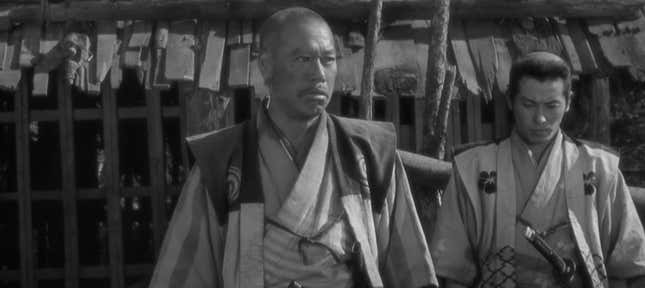
“In his commitment to linear narrative, his apparent lack of interest in Brechtian distancing devices, his refusal to develop a rigorous mode of political filmmaking, and his seeming inability to move beyond a method of social analysis centered on the individual, Kurosawa stood for the newer directors as the representation of all that was moribund and reactionary about the Japanese cinema,” writes Stephen Price in The Warrior’s Camera. Emperor Kurosawa was panned and denunciated by the younger generation of Japanese filmmakers, with his movies derided as “simplistic humanism.” Nagisa Oshima, of Merry Christmas, Mr. Lawrence fame, and Shinoda reportedly disliked Kurosawa. The criticism stung. He wanted to make films explored humanity and not the explicit political treatises of the Japanese and French New Waves.
“Reporters always ask me what the content of my film is and I tell them that there is no such a thing,” Kurosawa said in 1991. “I say ordinary things. A film is not supposed to be a lecture.”
Donald Richie, who extensively interviewed Kurosawa and wrote the first English language book about him, did not believe the director was interested in putting politics in his movies. “I doubt Kurosawa intended any political implication,” Richie wrote in Sight & Sound regarding Yojimbo. “He [Kurosawa] is not interested in politics. The moral aspects of the problem—of any problem—appeal to him most.”
In The Films of Akira Kurosawa, Donald Richie further wrote, “Kurosawa thinks of himself as a socially-minded rather than a politically-minded man... Because he wants to see a social problem whole and in all of its parts, Kurosawa has rarely lent himself to politics since this presumes a choosing of sides, and this is just what he is unwilling to do.”
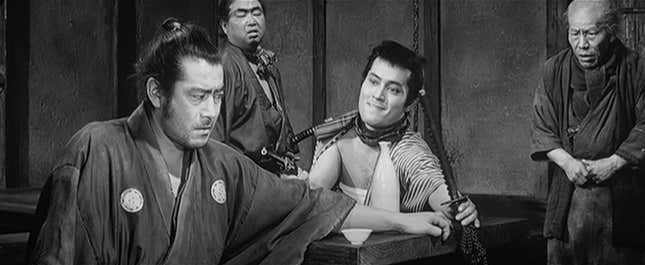
He is, like Toshihiro Mifune’s character in Yojimbo sitting on the rooftops, looking down at different facts fighting. This attitude was perceived as elitism by the Japanese New Wave directors. But it can also be seen as about the intent behind his filmmaking goals by the Japanese New Wave directors. The anti-Kurosawa backlash of the late 60s and early 70s did not take the director on his terms, viewing the movies instead through the lens of what young directors thought he should be making, not what he had actually made.
Not taking Kurosawa on his terms, perhaps, caused the younger generation of Japanese filmmakers to misread his motion pictures. As mentioned above, Kurosawa believed in individuals and self-determination, which is a political philosophy, but not a political commentary, common in many art films of the 60s and 70s. Kurosawa movies were about humanity and the power of self. That’s what Ghost of Tsushima is also about.
Due to his big budgets, box office busts, failure of the Hollywood film Tora! Tora! Tora!, and the increasing popularity of TV, Kurosawa stopped being able to get projects off the ground. One of Japan’s truly great filmmakers couldn’t get a picture made. Like the characters in his films, the society in which Kurosawa had once inhabited had changed, and he had to seek international financing and help to finish his later projects.
“I feel that’s what’s wrong with the Japanese film industry today is that the marketing side has taken over the decision-making power on what film is going to be made,” Kurosawa said later in his life. “There’s no way that marketing-type people—at the level their brains are at—can understand what’s going to be a good film and what isn’t, and it’s really a mistake to give them hegemony over all this. The film companies have become defensive. They only way to compete with television is to make real films. Until this situation is corrected, it’s really going to be difficult for filmmakers in Japan.” These remarks are reminiscent of what Yakuza director Toshihiro Nagoshi said impressed him about Ghost of Tsushima having an older protagonist—something he believes a typical Japanese company’s marketing department would strike down.
At the core of Kurosawa’s films are humanity, relationships, and emotion. His movies are moving, exciting, and stunning. And at the center of that was the idea that individuals push back and push forward. Don’t be held back. Don’t get bogged down. Do what works and what’s necessary. While there’s a lot Ghost of Tsushima does not get right about Japan, there is a lot it certainly does about Akira Kurosawa.